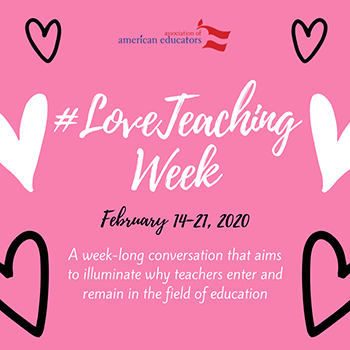February 14, 2020
 By Gary Abud Jr.
By Gary Abud Jr.
We all love helping people, right? That’s what led us into a service profession like education in the first place, isn’t it?
But right now there is someone out there who is considering resigning from their classroom, quitting their school and walking away altogether from teaching anyone anything anywhere anytime. Ever again.
To that person, I say: please read on. What could it hurt?

Serving others — putting another person before oneself — does not come naturally to people. If you’ve ever seen a piñata at a children’s birthday party, you know this truth is self-evident, even from a young age! But seriously — you really have to work at it constantly to develop and maintain a posture of service.
It might be reasonable to conclude that when someone enters the teaching profession, he or she does it with altruistic motives, right? So, what about when an individual exits teaching: Did their care for others fade or was it even there to begin with?
As someone who stepped away from classroom teaching to go into administration, and eventually left working in schools altogether, I’ve been there.
I’ve reflected on these questions myself and get asked them all the time. Family or friends have said, “Do you miss teaching?” I usually reply, “I still teach, but just not like I used to.” While I no longer am a high school science teacher,
in my consulting business I teach one on one to help young people do better in school and adults do better in their careers. I coach and mentor individuals to improve their personal effectiveness in career, school and life. I have coached dozens of teachers and school administrators in their work. And I still get to teach groups when I do workshops, presentations for
my children’s book, or when I teach Bible Study classes at my church.
So did my care, concern and love for others fade away from what it once was that drove me into teaching? No. Certainly not. In fact, it was just that motivation that led me to move on from working in schools but continue to teach in different ways. Not until I really reflected on my true reasons that took me into teaching in the first place did I realize I had to do things differently. I wanted to make a bigger impact, a bigger difference, than I felt I could from just one classroom. By teaching teachers now, coaching individuals to do better at work, at home or in school, and by sharing my children’s book with students at multiple schools, I’ve been able to multiply my impact in education. And it all still comes from the same place: genuine care — love — for others.
That being said, with frequent reports of
teacher shortages, dwindling numbers of college students choosing to major in education, and staggering numbers of
teachers leaving the profession, it can be easy to question the narrative of altruism in teaching, or even education in general.
Some might be asking: How can this happen to “the profession that creates all other professions”?
The truth is, despite our best intentions, when the going gets busy, we can find ourselves just going through the motions — even in a service profession like teaching. We can fall into a subtle trap: becoming disconnected with our personal “why” that led us to become teachers in the first place can attenuate our hearts for serving others in the work we do.
The reality is it can happen to anyone and any team of people. That’s why, whether in the workplace, at home or through service of any kind, the solution to the problem is the same:
(re)connect to your “why.”
But the point still remains, even among the best of the best education leaders, that when you are disconnected from your “why” or when you don’t keep a love for others as the fulcrum of your work, the seeds of bitterness can take root, grow and cause weeds to develop in the garden of your heart you have for the people you serve in education.
Fortunately, we are not the first educators to face this issue. In fact, we aren’t even the only profession to whom this happens. And there are countless people out there trying to
do something about the negativity and burnout that plagues the service professions.

One such endeavor to recharge the positivity in education is the
#LoveTeaching Week (LTW) campaign.
Started by two state teachers of the year and one national teacher of the year
five years ago, this organic movement invites teachers to
focus on what they love about teaching by recalling and sharing the reasons that brought them into the profession and the joy that sustains them in their work.
LTW takes place during Valentine's Day week each year (Feb. 14-21) and is open to teachers everywhere to participate. There are
online and offline activities in which you can participate, simply by using the hashtag #LoveTeaching across social channels. The website
WeLoveTeaching.org has great ideas for how to take part and get your school involved.
In a year where so many talk about their vision for the future, you might just find that looking backward serves you better in terms of moving forward. So this year, consider joining in #LoveTeaching Week to reconnect with your “why” and share in the joy of shaping lives, leading learning, and serving others through teaching.
For many, the “why” that called them to choose teaching stems from the supreme ethic of life — love. That means that when we are looking back at the love for others that brought us to the work of educating students — the teaching profession itself — it helps us continue leading with love at the center of our being. That’s because
the remedy for a restless heart in a service profession like teaching is to reconnect with your reasons that brought you into the profession — the love that first sparked you to consider helping others and making a difference in classrooms, schools and beyond.
And leading with love will naturally keep us connected with the inspiration that brought us into the work we do, and ultimately fan into flames our passion for serving others.
Gary Abud Jr. is an award-winning educator, author of “Science With Scarlett” and a double cornea transplant recipient who, since having his sight restored, was moved to use his teaching gifts to make science fun for kids. He lives with his family near Detroit, teaches personal effectiveness skills to individuals and writes to inspire children, like his own daughter, to love science. Gary is the 2014 Michigan Teacher of the Year. Learn more about Gary’s work at SagaEducators.org and his book at ScienceWithScarlett.com. Image courtesy: https://my.bible.com/bible/111/PRO.12.25.NIV